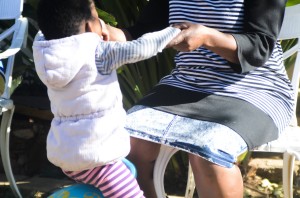Our “Granny Programme” has been running for just over two years. It has filled a critical gap that existed between the care being provided by our Child Care Workers and the added stimulation of our volunteer programme.
PAAH was the second South African Children’s Home to implement a formal Granny Programme and some inevitable tweaks were made to adapt it to our unique environment. Happily, this could be done.
The pilot phase of the Programme was implemented in partnership with The Ububele Educational and Psychotherapy Trust and has been funded by the German Federal Ministry for Economic Development and Cooperation (BMZ) which provided stability during the start-up period. The grant will soon come to an end and we are seeking alternative sources of funding to keep the programme running uninterrupted.
But, what is the Granny Programme?
The Granny Programme concept (which was originally the brainchild of Spence-Chapin in the USA) is a simple but highly effective one.
In a nutshell, mature women (“Grannies” or Gogos as we know them) from the local community are paid a small monthly stipend. Each Granny is allocated two young children and spends two hours per day with each child five days a week. They follow an organised routine during their time with them.
The Grannies have become trusted, primary caregiver figures to our little people, giving them a real opportunity to bond and form firm emotional attachments which can then be transferred to their future parents or caregivers. During their time with the babies and toddlers, the Grannies also offer the type of individual stimulation that is important for their healthy overall development.
The consistent stimulation and attention from a loved caregiver is hugely significant because, all too often, children in institutional care (like PAAH) do not have this type of experience and that, in turn, has a lifelong, detrimental impact on all areas of their social, emotional, cognitive and physical development.
We celebrate the fact that most of our babies now demonstrate age-appropriate developmental behaviour, and this is usually after quite a short period of being matched with their own Granny.
The Grannies have all been trained to ensure a good understanding of how children develop (as well as the central roles played by attachment/bonding and stimulation in Early Childhood Development). They are also able to record the progress of their babies on a regular basis (following the guidelines of the Early Learning Accomplishment Profile or E-LAP). These records of early development are passed onto their adoptive parents.
No man (woman or child) is an island
The Granny Programme doesn’t stand alone in a vacuum. Research in the field of human development has influenced the national and international policies that drive the implementation of Early Childhood Development (ECD) practices. Most notable is the growing emphasis on the findings that a nation’s future development depends on its success in unlocking the potential within its youngest population! [1]
This includes evidence that the key to unlocking human capital lies in the quality of the environment in which the foetus, infant and young child develops, especially during what is commonly referred to as ‘The First 1000 Days” of life (which includes in utero and the first two years after birth).[2]
Isn’t it a bit mind-blowing to realise that if, in the very earliest days of life, the foundational development of the brain and skills is hampered, ALL future development will in turn be limited?
The First 1000 Days has thus become recognised as a unique and invaluable window of opportunity to secure the optimal development of the child[3].
In fact this is the exact time period that children are typically in our care and therefore the time during which the Grannies can make a world of difference.
In addition to the benefits to our babies and their future adoptive families, the Programme also ensures that the benefits of training given to the Grannies reaches back into the communities where they all active in raising other children either in the own family groups or through civic organisations.
Future Plans
PAAH and Joburg Child Welfare are absolutely committed to continuing our Granny Programme and sustaining the value that it adds to our children’s lives, not just for now but throughout their growth. Achieving this, however, does depend on our ability to secure new funding and we are therefore embarking on an energetic campaign to raise the support that is needed.
The path ahead will be challenging but oh so worth it.
[1]Republic of South Africa. 2015. National Integrated Early Childhood Development Policy. Pretoria: Government Printers



